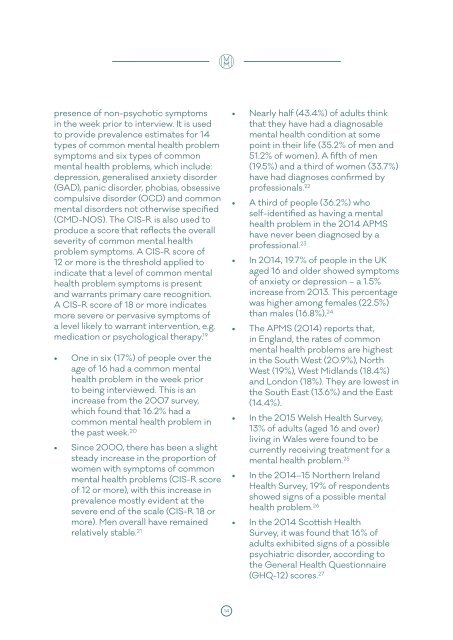FUNDAMENTAL FACTS ABOUT MENTAL HEALTH 2016
fundamental-facts-about-mental-health-2016
fundamental-facts-about-mental-health-2016
Create successful ePaper yourself
Turn your PDF publications into a flip-book with our unique Google optimized e-Paper software.
presence of non-psychotic symptoms<br />
in the week prior to interview. It is used<br />
to provide prevalence estimates for 14<br />
types of common mental health problem<br />
symptoms and six types of common<br />
mental health problems, which include:<br />
depression, generalised anxiety disorder<br />
(GAD), panic disorder, phobias, obsessive<br />
compulsive disorder (OCD) and common<br />
mental disorders not otherwise specified<br />
(CMD-NOS). The CIS-R is also used to<br />
produce a score that reflects the overall<br />
severity of common mental health<br />
problem symptoms. A CIS-R score of<br />
12 or more is the threshold applied to<br />
indicate that a level of common mental<br />
health problem symptoms is present<br />
and warrants primary care recognition.<br />
A CIS-R score of 18 or more indicates<br />
more severe or pervasive symptoms of<br />
a level likely to warrant intervention, e.g.<br />
medication or psychological therapy. 19<br />
• One in six (17%) of people over the<br />
age of 16 had a common mental<br />
health problem in the week prior<br />
to being interviewed. This is an<br />
increase from the 2007 survey,<br />
which found that 16.2% had a<br />
common mental health problem in<br />
the past week. 20<br />
• Since 2000, there has been a slight<br />
steady increase in the proportion of<br />
women with symptoms of common<br />
mental health problems (CIS-R score<br />
of 12 or more), with this increase in<br />
prevalence mostly evident at the<br />
severe end of the scale (CIS-R 18 or<br />
more). Men overall have remained<br />
relatively stable. 21 •<br />
•<br />
•<br />
•<br />
•<br />
•<br />
•<br />
Nearly half (43.4%) of adults think<br />
that they have had a diagnosable<br />
mental health condition at some<br />
point in their life (35.2% of men and<br />
51.2% of women). A fifth of men<br />
(19.5%) and a third of women (33.7%)<br />
have had diagnoses confirmed by<br />
professionals. 22<br />
A third of people (36.2%) who<br />
self-identified as having a mental<br />
health problem in the 2014 APMS<br />
have never been diagnosed by a<br />
professional. 23<br />
In 2014, 19.7% of people in the UK<br />
aged 16 and older showed symptoms<br />
of anxiety or depression – a 1.5%<br />
increase from 2013. This percentage<br />
was higher among females (22.5%)<br />
than males (16.8%). 24<br />
The APMS (2014) reports that,<br />
in England, the rates of common<br />
mental health problems are highest<br />
in the South West (20.9%), North<br />
West (19%), West Midlands (18.4%)<br />
and London (18%). They are lowest in<br />
the South East (13.6%) and the East<br />
(14.4%).<br />
In the 2015 Welsh Health Survey,<br />
13% of adults (aged 16 and over)<br />
living in Wales were found to be<br />
currently receiving treatment for a<br />
mental health problem. 25<br />
In the 2014–15 Northern Ireland<br />
Health Survey, 19% of respondents<br />
showed signs of a possible mental<br />
health problem. 26<br />
In the 2014 Scottish Health<br />
Survey, it was found that 16% of<br />
adults exhibited signs of a possible<br />
psychiatric disorder, according to<br />
the General Health Questionnaire<br />
(GHQ-12) scores. 27<br />
14


